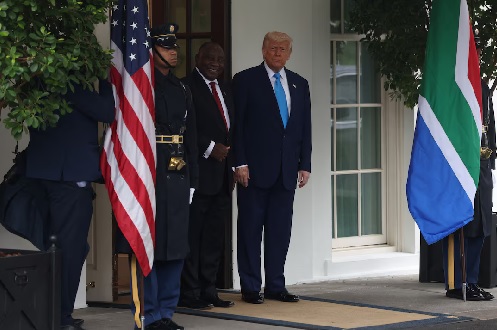South Africa’s President Cyril Ramaphosa in in the US to hold crucial talks at the White House with President Donald Trump on Wednesday, May 21.
The high-stakes meeting that could improve or deteriorate already frosty relations between the nations.
Ramaphosa is hopeful his visit could end a diplomatic feud that sparked aid cancellations by Trump and fueled the expulsion of his nation’s ambassador to the US – but some in his country fear the meeting could go off the rails, as it did for Ukrainian President Volodymyr Zelensky in the notorious Oval Office encounter in February.
There are also fears that the African nation could now potentially lose some of its US trade privileges as relations between the two countries sour.
Ramaphosa’s trip comes just over a week after a group of 59 White South Africans arrived in the US after being granted refugee status.
Trump and his ally Elon Musk, who was born and raised in the country, claimed the South Africans were being persecuted back home. On Tuesday, US Secretary of State Marco Rubio said it was in the US national interest to prioritize White South Africans for refugee resettlement, telling a hearing that they’re “a small subset” who “are easier to vet.”
Rubio did not rule out that their race is a factor in the resettlement but argued that they are being “persecuted” for being White.
The Trump administration has sharply criticized an expropriation law, which was enacted in South Africa earlier this year, in an attempt to reverse historic racial inequalities. The law empowers South Africa’s government to take land and redistribute it – with no obligation to pay compensation in some instances – if the seizure is found to be “just and equitable and in the public interest.”
During a discriminatory apartheid government that ended in the mid-1990s, Black South Africans were forcibly dispossessed of their lands for the benefit of Whites. Today, some three decades after the end of apartheid, Blacks, who comprise over 80% of the country’s population of 63 million, own around 4% of private land.
Trump claimed that lands belonging to minority Whites, who own 72% of the nation’s agricultural land, were being targeted for confiscation, and cited unverified claims that “a genocide is taking place” in South Africa. He added that “White farmers are being brutally killed” amid reports of farm attacks.
South African authorities have pushed back hard against those claims with police minister Senzo Mchunu saying there was no evidence of a “White genocide” in the country.
In a statement in February, the South African Police Service urged the public “to desist from assumptions that belong to the past, where farm murders are the same as murders of white farmers.”
Trump also disapproves of South Africa’s genocide case before the International Court of Justice against the US ally Israel.
Ramaphosa’s office said he would “discuss bilateral, regional and global issues of interest” with the US president at the White House. Analysts say the meeting could pose a tipping point for their fraught ties.
The US is South Africa’s second-largest trading partner, and the African nation benefits the most from a US trade agreement that provides preferential duty-free access to US markets for eligible sub-Saharan African nations.
Under that agreement, South Africa is the main agricultural exporter and exports two-thirds of its agricultural goods to the US, tariff-free. But some US lawmakers want those benefits withdrawn when the trade agreement is reviewed this year.

